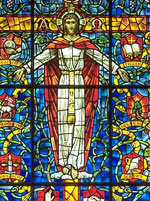Last October, I reported to you that the Credentials Committee of the Church of God in Michigan had approved me for ordination. I was indeed ordained at the state’s General Assembly meeting in November, and now we are in the midst of planning for my formal ordination service at Mt. Haley on May 25, one month from today. Through a couple of conversations, it became apparent to me that it might be helpful for you to know exactly what this process has entailed and what it means for my ministry.

The Church of God ordains pastors on a state-by-state basis. I began the ordination process in 2007 while I was in seminary in Indiana. I met with Indiana’s Credentials Committee twice, took a Bible content exam, and began reading a selection of required books. This was in addition to my seminary reading list: over five years, I took ninety hours of graduate courses to earn a Master of Divinity degree. Also, as part of the ordination process, I wrote and defended fourteen theological statements (which are available on our website, if you’re interested to read them). All of this preparation was to ensure that I am theologically sound and at least somewhat prepared to enter a ministry position.
During this time, I moved through the first two phases of the ordination process. In Indiana and Michigan (and most states), the Church of God classifies ministers as “commissioned,” “licensed,” and finally “ordained,” in increasing order of call, trust, and responsibility. At the beginning of my process, I was “commissioned” in Indiana; that was a recognition of the fact that I sensed a call to enter ministry – and that it seemed right to the committee as well. After I completed the work listed in the previous paragraph, I became “licensed.” This allowed the world to consider me a minister from a legal perspective: I could perform wedding ceremonies and file taxes as a minister. For all intents and purposes, a licensed minister can do anything you’d expect a fully ordained minister to do.
All of this happened in Indiana. Then, when Mt. Haley called me to become its senior pastor and Tara and I moved to Michigan, my ministerial credentials were transferred to the Church of God in Michigan. Since that time, I have met with Michigan’s Credentials Committee twice so they could review my theological statements, get to know my call to ministry, and prepare me for full ordination.
Another part of that preparation is a relationship with a “supervising mentor.” Rev. Dr. Kevin Earley, pastor of the Metropolitan Church of God in Detroit, was assigned to serve in this role for me. We were acquaintances from seminary – he earned his doctorate while I worked on my master’s – and in the past year we have had a handful of phone conversations about pastoral ministry, its challenges, and its opportunities.

Another component is a document called a “Life and Ministry Plan,” which is like a personal mission statement for pastors. This “LAMP” is a living, growing document that is to inform and adapt to my life and ministry over the course of my life. This requirement was waived in my case because I am currently working on my “LAMP” with my “SHAPE” group (“Sustaining Health And Pastoral Excellence”), a group of five pastors who meet each month for connection, support, and mutual growth. (My “LAMP” should be completed sometime this year.)
All of this culminated in the Credentials Committee’s recommendation that I be presented for ordination at the state General Assembly meeting last November. At that meeting, four other candidates and I were presented to the assembly. We each gave a three-minute testimony/summary of our call to ministry, and then the gathered ministers and church representatives voted whether or not to ordain each of us. The rules state that if six “no” votes are received for any candidate, then his or her ordination is withheld for further consideration. That did not happen in my case, so my ordination was technically approved in November.
What remains is a formal ordination service, which we have scheduled for May 25. At this service I will be given my official certificate of ordination, and the whole process will finally be complete.
Ordination is a call to ministry in the church. If I were not serving in an official ministry position, I could not be ordained. And in the future if I should not have a ministry position for a significant length of time, my ordination credentials could be revoked. Ordination means that I am fully recognized as a minister in the Church of God, but it also means that I am fully accountable as a minister in the Church of God. I am welcome to serve as pastor, but I am not free to do whatever I wish. I am trusted to serve the church well, but I must not abuse that trust. I have the support of the Church of God movement behind me, but that is not license for me to go astray from what God intends for my life and ministry.
The Bible is full of examples of priests and Levites who were called to serve God. Many of them served faithfully for their whole lives, while others went astray and were censured by God and by the faith community. I intend to be found in the “faithful” group when the final tally is counted.
If you have any questions about the ordination process or what it means for me or for Mt. Haley, please feel free to ask me!
–Pastor David


